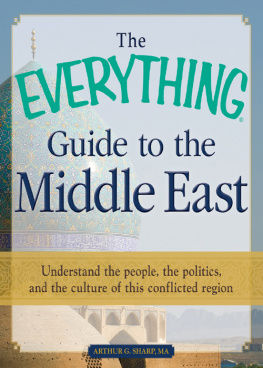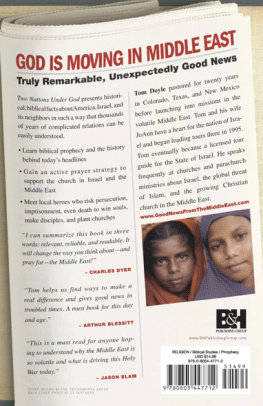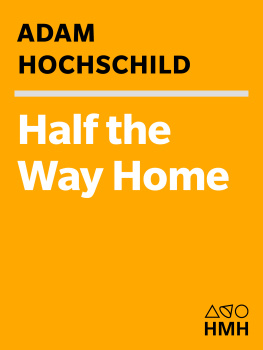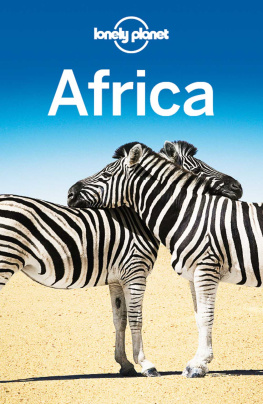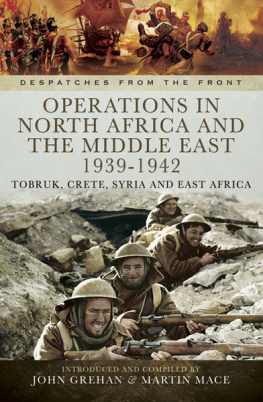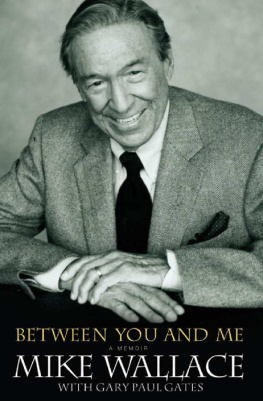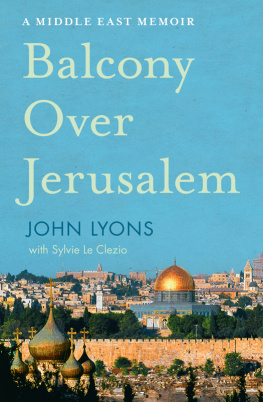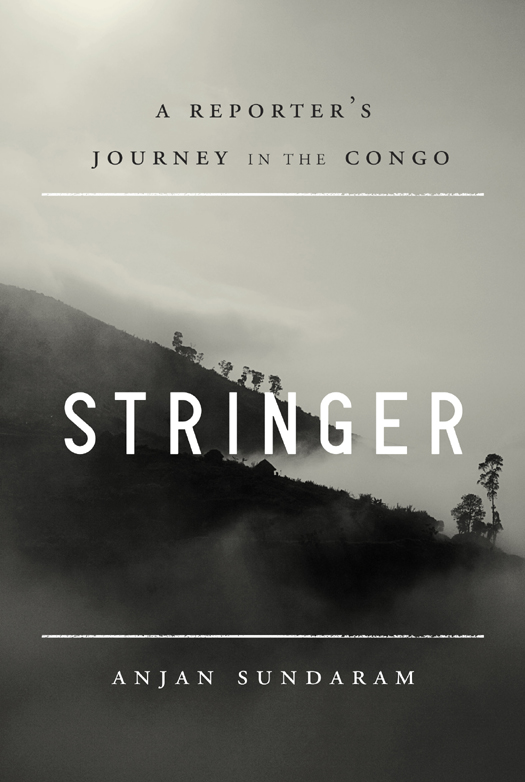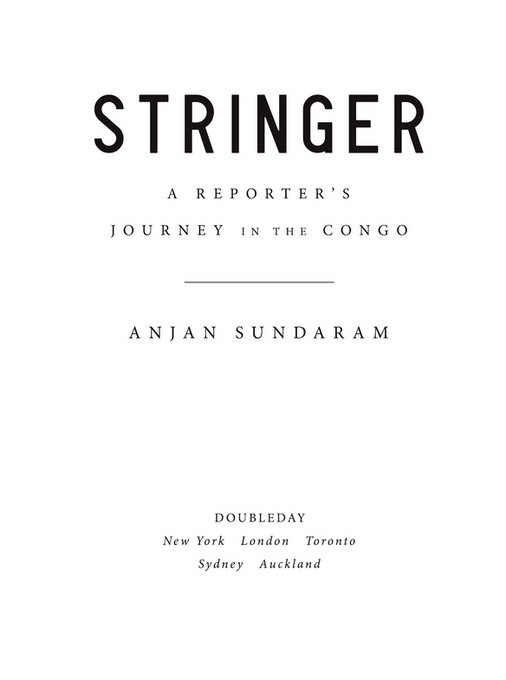
Copyright 2014 by Anjan Sundaram
All rights reserved. Published in the United States by Doubleday, a division of Random House LLC, New York, and in Canada by Random House of Canada Limited, Toronto, Penguin Random House Companies.
Originally published in India by Penguin Books India, New Delhi.
www.doubleday.com
DOUBLEDAY and the portrayal of an anchor with a dolphin are registered trademarks of Random House LLC.
Jacket design by Oliver Munday
Jacket photograph Craig McCausland/E+/Getty Images
Library of Congress Cataloging-in-Publication Data
Sundaram, Anjan.
Stringer : a reporters journey in the Congo / Anjan Sundaram.
p. cm.
(electronic)
1. Sundaram, AnjanTravelCongo (Democratic Republic) 2. Congo (Democratic Republic)Description and travel. 3. Congo (Democratic Republic)Social conditions21st century. I. Title.
DT 647.5. S 86 2014
967.51034 DC 23 2013000980
ISBN 978-0-385-53775-9
eBook ISBN: 978-0-385-53776-6
v3.1
To the family that welcomed me in Congo, to Nat
CONTENTS
I
LINES OF DISTRESS
II
HALF EMERGENCES
III
MATTERS OF BELIEF
PART I
LINES OF DISTRESS
1
I was already feeling perturbed. There was something perhaps about the bars large parasol umbrellas, lit starkly by the hanging naked bulbs. Or it could have been the figures flitting behind them, beyond my view.
I had sensed his presence, his curt movements. But they did not seem malicious. Then he lunged for my table, and I found myself running in the night. I ran with all my force. And I would have said I was faster than him. But I might have imagined my own speed from the people who passed me by like pages in a flip-book: mamas with bananas on their heads, vendors carting cages of birds and monkeys, the crocodile-leather pointy-shoed bureaucrats. They turned to stare at me, the whites of their eyes stabbing the darkness and piercing my face, my side, my back. Who are you looking at? Hes the thief, stop him!
I squinted to keep sight. His form was like an illusionfeet leaping off the earth, driving up plumes of dust. His hands pulled at his falling shorts; and when he looked back to see I was still running he screamed in surprise, showing dull teeth, and turned into a narrow passage.
We regressed from the city. The alleys amplified the darkness and my shallow breaths filled the spaces between the walls that rose on either sidegray walls high and long between which I ran blindly, without thinkinguntil we came to a field. And for a moment I lost sight of him.
I turned sharply, feeling a panic rise.
You! He appeared, empty-handedand jeering at me, almost as if he wanted to play. A sickly chicken of a boy, with limbs extending like antennae from his belly. You have my phone! I yelled. T! I refuse! The ground was wet and yielding, covered in waste, cans, wrappers. The smell was rotten. It was like nothing I had known. A landfill in the middle of the city. Of what was I afraid?
Ill give you money.
How much? He wiped his shoulder over his mouth; his face was covered in sweat.
A group of children skipped toward us. I reached into my pocket for my notebook and wallet. The boy turned, and I saw a wound on a hairless part of his scalp.
Keep the phoneI pointed into my palmI only need the numbers inside. He smiled, as if smelling a trick. I felt frustrated at my carelessness. I didnt have money to hand out, and those numbers were precious. I was new in the country and had few friends. Most meetings had been gained by chance, in the street, at the odd conference, in a waiting room or at a bar; they had not been planned, necessary, or even particularly friendly. And yet they had taken on, in my mind, a great importance.
Kinshasa, when I first arrived, had felt giant, overwhelming. The scenes on the roads, the people moving from here to there, the languages, gestures, staresthe smallest rituals had seemed imbued with meaning and purpose, and the city appeared as a collusion of secrets only the locals shared. But these strangers I had metjournalists, businessmen, minor politicianshad become bearings from which I navigated the confusion. With them I constructed a sense of place, and for moments felt part of the mystery. So the phone contained my personal map; and without it I felt lost, as though I had newly arrived for a second time and was again without connection. The bewilderment was now greater. And having exhausted the initial excitement of the new place, I now found the city distant, hostile.
My sigh came out heavy and sharp; it startled the boy. Already he was stepping away. I half tripped forward and yelled, How do I find you? Whats your name?
Guy.
And, making a cackling noise, he ran behind a mound. I felt suddenly strained.
I could not tell the way by which I had comeso I picked a nearby narrow street and followed it for a mile or two. The walk was not unpleasant. We were in the middle of a brief rainless period, in the summer; and there was a slight breeze. But even in this season the climate was humid and hot, and in such conditions everything grew quickly: the nails, the hair, the plants and insects. All attained giant or copious proportions. I stopped to inspect a falling banana tree. Its top was sappy, and crawling with red ants.
The city also grew daily. It was a center of migration for the region, like So Paulo or Calcutta, and already black Africas largest capitala collapsed metropolis, unable to assure even the survival of its nine million people. But still the dispossessed came in floods from the villages.
I passed some women sitting on their porches, washing down their children from canisters of soapy brown water. They looked up. Bonjour, I said. Slowly they repeated the word, as though they had not expected it.
The main road was unlit and cars streamed past. People stood in packs, frantically waving their hands and rushing to each slowing taxi. I made a circle with my forefinger pointing at the ground and twenty minutes later found space in a minibus going north. My house was to the south, but it was the end of the working day and I was commuting like the masses. This was my way of finding a free seat.
I trembled incessantlyas did the buss plywood floor. The metal chassis around me was covered in the dents of countless collisions. The driver took us to the citys commercial area, cruising along the street edge and gathering passengers. A man hanging on the back of the bus constantly yelled our route. People swelled toward us like a sea. We sat in an old Volkswagen whose twelve cushioned seats had been pulled out and replaced with wooden benches; soon we were more than thirty inside, cramped side by side, hands between our knees. We squeezed more for the woman who brought in her drooling infant. The windows were sealed shut, so there was no breeze, and inside it was suffocating. The human smells engulfed us. But I looked through the glass and saw the movement; and this perception of the wind gave some false relief. We came to the harbor, with its broken heavy machinery. And the two- and three-story buildings stained with long black stripes: algae, rising from within the cement and blooming in the open. One imagined the decomposition that lived hidden within. The city seemed to be falling apart, building by buildingstructures crumbled so slowly they seemed almost to melt. At a roundabout we circled a brick monumentblack, as though burned. The statue of the Belgian king had long been toppled, leaving two pillars framing an empty space. Lining the roads were heaps of garbage, glowing like embers and giving off black smoke.


